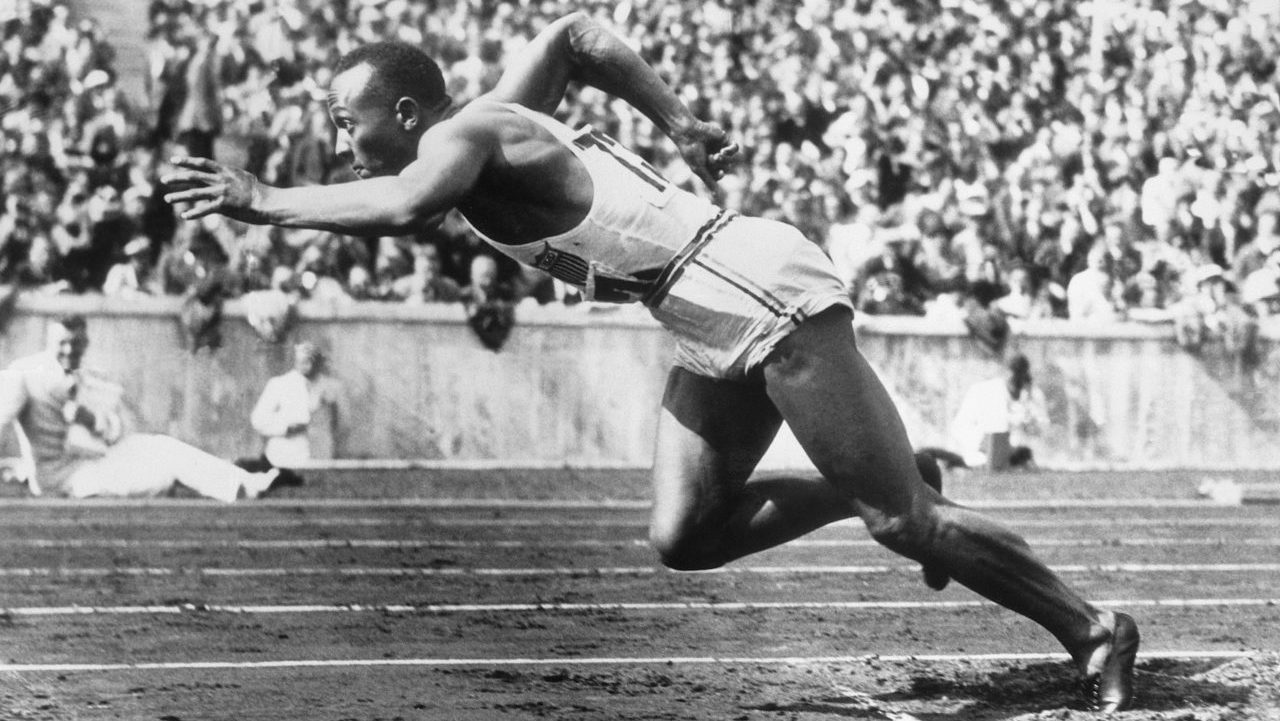
In 1938, one of the world’s most famous athletes opened a laundry business.
Jesse Owens Dry Cleaning Company in Cleveland proved how difficult it could be for Olympians of his day to turn global triumph into a steady paycheck. In 1939, Owens filed for bankruptcy.
Limited by the strictures of amateurism and the oppression that came with being a Black man in the 1930s, Owens traveled the country in search of appearance fees at local events. Sometimes he’d race fans, cars or even horses.
“People said it was degrading for an Olympic champion to run against a horse,” Owens said later. “But what was I supposed to do? I had four gold medals, but you can’t eat four gold medals.”
By the 1970s, however, Owens found a consistent calling: public speaking. In 1972, he gave nearly 100 addresses and reportedly earned about $75,000 (more than $500,000 in 2024 dollars). He learned to shape his story of achievement on the track into one that resonated in front of a room of salesmen, statisticians or schoolchildren.
More than 50 years later, today’s Olympians and Paralympians are increasingly doing the same.
Methods for turning medals into money have multiplied over the last 100 years. Athletes today sign long-term brand deals, go into coaching, become media personalities, or even mount traveling shows that make millions. Others maintain social media stardom or reality TV status.
But possibly the most common, and sometimes most lucrative form of post-Games money making? The corporate speaking circuit.
Major companies like Coca-Cola and Google regularly bring in notable names to motivate employees, conferences use them to retain attendee attention, while schools and local speaker series constantly search for tentpole guests. Those gigs can make up 50% to 80% of an athlete’s annual revenue.
The overall “motivational speaking” market was estimated to generate $1.9 billion in revenues in 2019, headlined by former U.S. presidents, A-list celebrities and renowned gurus. But Olympians have proven popular, too, primarily for their relatability and four-quadrant appeal, not to mention the potential for photo ops with their iconic medals.
“Olympic speakers—it’s one category that’s kind of evergreen,” Wasserman Speakers VP Julie Leventhal said. “When people are putting on meetings and events, they’re looking for that story and messaging around setting a goal and teamwork and achieving excellence and having a winning mindset and resilience and overcoming adversity.”
Derek Parra, a 2002 gold medalist speed skater, began his speaking career after his agent, Patrick Quinn, got a call from a Florida hospital hoping Parra would attend one of their upcoming events and share his story for $20,000.
“I said to myself, did you say 20 grand?” Quinn recalled. “‘Hell yeah, he’ll be there.’”
The two worked on Parra’s routine as he developed a reputation on the scene and appeared at the Republican National Convention 10 years later in Tampa.
“The guy made, easily, over a million dollars speaking,” Quinn said. The experience motivated Quinn, now at Chicago Sports & Entertainment Partners, to develop a speaking-focused arm of the agency.
CSEP clients range from those making $1,500 for a visit to a Knights of Columbus chapter to others pulling in more than $50,000 for every speech. Olympians are trained to engage with a group of 40 top employees or a conference hall of 4,000-plus.
“Now our speaking business does more than our sponsorship business,” Quinn said.
From the athlete perspective, corporate speaking gigs offer a flexible schedule to fit around continued training, networking opportunities that can become off-ramps into the business world, and the chance to continue sharing a message following their time on the Olympic stage.
Online speaker registries list scores of medalists for event planners to choose from, including every member of Team USA’s Magnificent Seven gymnastics team from 1996. Several broadcasters have supplemented their income by joining the circuit, too.
Given the competition, establishing a permanent place at events requires dedication. There’s money to be made in the afterglow of Paris’ warmly received Games, but opportunities can dry up when the limelight moves on. Motivated athletes learn to embrace a new type of coaching as they improve their spiel.
They find that there is a hierarchy for gigs. Those who are comfortable in a Q&A setting live in one stratosphere, while others capable of delivering a knockout keynote address command higher figures.
“We know that if you send somebody out to speak, and they’re not fantastic, it’s going to be hard to continue to market them,” CSEP cofounder Jeannie Goldstein said.
A unique story helps. Along with the likes of Mia Hamm and Mike Tirico, one of Wasserman’s most visible speakers is Scout Bassett, who grew up in a Chinese orphanage and won bronze in both the women’s 100-meter dash and long jump competitions at the 2017 World Para Athletics Championships. She appeared at LinkedIn’s Speaker Series days that same month. Wasserman Speakers now works with a half-dozen Paralympians in addition to 40+ athletes with Olympic experience
For the agents, each Olympic Games brings a new opportunity to secure additional gigs for clients—and search for potential roster additions. Quinn monitors TV coverage and countless Google Alerts for athletes with compelling stories to tell.
Runner Grant Fisher and cyclist Kristen Faulkner jumped out to him with their surprising finishes. They could have long speaking careers, he believes, if they put in the effort.
Macro trends in the speaking industry drive top earners. One year, demand might spike for those who can speak about diversity or mental health awareness. Now, AI is all the rage.
“The good news,” Quinn said, “is you never really run out of people that want to be inspired.”

